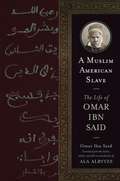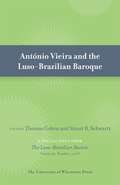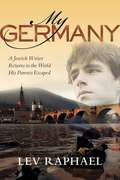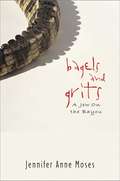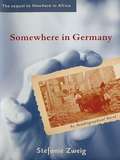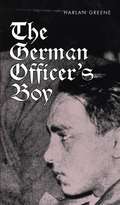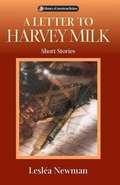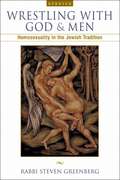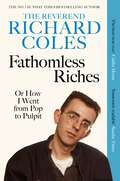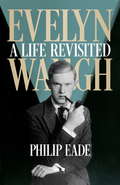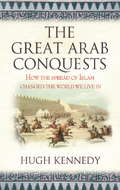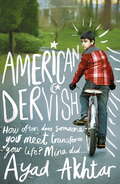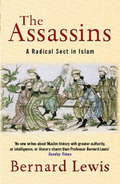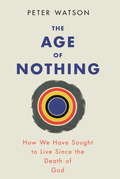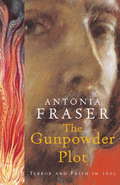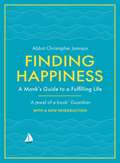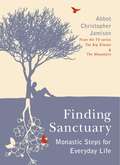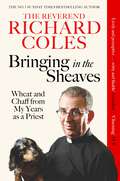- Table View
- List View
A Muslim American Slave
by Alison Liebhafsky Des ForgesBorn to a wealthy family in West Africa around 1770, Omar Ibn Said was abducted and sold into slavery in the United States, where he came to the attention of a prominent North Carolina family after filling “the walls of his room with piteous petitions to be released, all written in the Arabic language,” as one local newspaper reported. Ibn Said soon became a local celebrity, and in 1831 he was asked to write his life story, producing the only known surviving American slave narrative written in Arabic. In A Muslim American Slave, scholar and translator Ala Alryyes offers both a definitive translation and an authoritative edition of this singularly important work, lending new insights into the early history of Islam in America and exploring the multiple, shifting interpretations of Ibn Said’s narrative by the nineteenth-century missionaries, ethnographers, and intellectuals who championed it. This edition presents the English translation on pages facing facsimile pages of Ibn Said’s Arabic narrative, augmented by Alryyes’s comprehensive introduction, contextual essays and historical commentary by leading literary critics and scholars of Islam and the African diaspora, photographs, maps, and other writings by Omar Ibn Said. The result is an invaluable addition to our understanding of writings by enslaved Americans and a timely reminder that “Islam” and “America” are not mutually exclusive terms. This edition presents the English translation on pages facing facsimile pages of Ibn Said’s Arabic narrative, augmented by Alryyes’s comprehensive introduction and by photographs, maps, and other writings by Omar Ibn Said. The volume also includes contextual essays and historical commentary by literary critics and scholars of Islam and the African diaspora: Michael A. Gomez, Allan D. Austin, Robert J. Allison, Sylviane A. Diouf, Ghada Osman, and Camille F. Forbes. The result is an invaluable addition to our understanding of writings by enslaved Americans and a timely reminder that “Islam” and “America” are not mutually exclusive terms.
Antonio Vieira and the Luso-Brazilian Baroque
by Cohen Thomas Schwartz Stuart B.Preacher, politician, natural law theorist, administrator, diplomat, polemicist, prophetic thinker: Vieira was all of these things, but nothing was more central to his self-definition than his role as missionary and pastor. Articles in this issue were originally presented at a conference, “The Baroque World of Padre António Vieira: Religion, Culture and History in the Luso-Brazilian World,” Yale University, November 7–8, 1997, commemorating the three hundredth anniversary of Vieira’s death.
My Germany: A Jewish Writer Returns to the World His Parents Escaped
by Lev RaphaelLev Raphael grew up loathing everything German. A son of Holocaust survivors, haunted by his parents' suffering and traumatic losses under Nazi rule, he was certain that Germany was one place in the world he would never visit. Those feelings shaped his Jewish and gay identity, his life, and his career. Then the barriers of a lifetime began to come down, as revealed in this moving memoir. After his mother's death, while researching her war years, Raphael found a distant relative living in the very city where she had been a slave laborer. What would he learn if he actually traveled to the place where his mother had found freedom and met his father? Not long after that epochal trip, a German publisher bought several of his books for translation. Raphael was launched on book tours in Germany, discovering not so much a new Germany, but a new self: someone unafraid to face the past and transcend it.
Bagels and Grits
by Jennifer Anne MosesWhen Jennifer Anne Moses moved from a comfortable life in East Coast Jewish society to Baton Rouge, Louisiana, she volunteered at an AIDS hospice and rediscovered a profound commitment to her Jewish faith. Outstanding Book, selected by the American Association of School LibrariansBest Books for Regional Special Interests, selected by the Public Library Association
Somewhere in Germany
by Stefanie ZweigSomewhere in Germany is the sequel to the acclaimed Nowhere in Africa, which was turned into the Oscar-winning film of the same name. This novel traces the return of the Redlich family to Germany after their nine-year exile in Kenya during World War II. In Africa, Walter had longed for his homeland and dreamed of rebuilding his life as a lawyer, yet ultimately he and his family—wife Jettel, daughter Regina, and baby Max—realize that Germany seems as exotic and unwelcoming to them in 1947 as Kenya had seemed in 1938. Hunger and desperation are omnipresent in bombed-out Frankfurt, and this Jewish family—especially Regina, who misses Africa the most—has a hard time adjusting to their new circumstances. Yet slowly the family adapts to their new home amidst the ruins In Frankfurt, Regina matures into a woman and, though her parents want her to marry an upstanding Jewish man, her love life progresses in its own idiosyncratic fashion. She develops a passion for art and journalism and begins her professional career at a Frankfurt newspaper. Walter at last finds professional success as a lawyer, but never quite adjusts to life in Frankfurt, recalling with nostalgia his childhood in Upper Silesia and his years in Africa. Only his son Max truly finds what Walter had hoped for: a new homeland in Germany Although the Redlichs receive kindness from strangers, they also learn anti-Semitism still prevails in post-Nazi Germany. They partake in the West German “economic miracle” with their own home, a second-hand car, and the discovery of television, but young Max’s discovery of the Holocaust revives long-buried memories. Rich in memorable moments and characters, this novel portrays the reality of postwar German society in vivid and candid detail.
The German Officer's Boy
by Harlan GreeneWhat really happened that afternoon in November 1938, when the young Polish Jew walked into the German embassy in Paris and shots rang out? The immediate consequence was concrete: Nazi Germany retaliated with the "Night of Broken Glass," recognized as the beginning of the Holocaust. Lost and overlooked in the aftermath is the arresting story of Herschel Grynszpan, the confused teenager whose murder of Ernst vom Rath was used to justify Kristallnacht. In this historical novel, award-winning writer Harlan Greene may be the first author to take the Polish Jew at his word. Historians have tried to explain away Herschel Grynszpan's claim that he was involved in a love affair with vom Rath; Greene, instead, traces the lives of the underprivileged and persecuted Herschel Grynszpan and the wealthy German diplomat Ernst vom Rath as they move inevitably towards their ill-fated affair. In spare, vivid, and compelling prose, Greene imagines their world, their relationship, and their last horrific encounter, as they tried to wrest love and meaning from a world that would itself soon disappear in a whirlwind of disaster and madness.
A Letter to Harvey Milk
by Lesléa NewmanNewman's stories look at various topics from a Jewish lesbian perspective: AIDS/the Names Project Quilt ("Something Shiny", aging grandparents ("Sunday Afternoon"), homophobioa ("A Letter to Harvey Milk"), assimilation vs. tradition (One Shabbos Evening"), incest ("The Best Revenge"), the Holocaust ("Flashback"), and others. A glossary of Yiddish terms is included.
Doubly Chosen: Jewish Identity, the Soviet Intelligentsia, and the Russian Orthodox Church
by Judith Deutsch KornblattDoubly Chosen provides the first detailed study of a unique cultural and religious phenomenon in post-Stalinist Russia—the conversion of thousands of Russian Jewish intellectuals to Orthodox Christianity, first in the 1960s and later in the 1980s. These time periods correspond to the decades before and after the great exodus of Jews from the Soviet Union. Judith Deutsch Kornblatt contends that the choice of baptism into the Church was an act of moral courage in the face of Soviet persecution, motivated by solidarity with the values espoused by Russian Christian dissidents and intellectuals. Oddly, as Kornblatt shows, these converts to Russian Orthodoxy began to experience their Jewishness in a new and positive way.
Wrestling with God and Men: Homosexuality in the Jewish Tradition
by Steven GreenbergWrestling with God and Men is the product of Rabbi Steven Greenberg's ten-year struggle to reconcile his homosexuality with Orthodox Judaism. Employing traditional rabbinic resources, Greenberg presents readers with surprising biblical interpretations of the creation story, the love of David and Jonathan, the destruction of Sodom, and the condemning verses of Leviticus. But Greenberg goes beyond the question of whether homosexuality is biblically acceptable to ask how such relationships can be sacred. In so doing, he draws on a wide array of nonscriptural texts to introduce readers to occasions of same-sex love in Talmudic narratives, medieval Jewish poetry and prose, and traditional Jewish case law literature. Ultimately, Greenberg argues that Orthodox communities must open up debate, dialogue, and discussion--precisely the foundation upon which Jewish law rests--to truly deal with the issue of homosexual love.
Fathomless Riches: Or How I Went From Pop to Pulpit
by Richard ColesThe Reverend Richard Coles is a parish priest in Northamptonshire and a regular host of BBC Radio 4's Saturday Live. He is also the only vicar in Britain to have had a number 1 hit single: the Communards' 'Don't Leave Me This Way' topped the charts for four weeks and was the biggest-selling single of its year. Fathomless Riches is his remarkable memoir in which he divulges with searing honesty and intimacy his pilgrimage from a rock-and-roll life of sex and drugs to a life devoted to God and Christianity. Music is where it began. Richard Coles was head chorister at school, and later discovered a love of saxophone together with the magic of Jimmy Somerville's voice. Against a backdrop of intense sexual and political awakening, the Communards were formed, and Richard Coles's life as a rock star began. Fathomless Riches - a phrase characteristic of St Paul and his followers - is a deeply personal and illuminating account of a transformation from hedonistic self-abandonment to 'the moment that changed everything'. Funny, warm, witty and wise, it is a memoir which has the power to shock as well as to console. It will be hailed as one of the most unusual and readable life stories of recent times.
Fathomless Riches: Or How I Went From Pop to Pulpit
by Reverend Richard ColesThe memoir of popular BBC Radio 4 SATURDAY LIVE presenter and former member of the Communards, the Reverend Richard Coles.'I love @RevRichardColes SO MUCH' Caitlin MoranFATHOMLESS RICHES is the Reverend Richard Coles's warm, witty and wise memoir in which he divulges with searing honesty and intimacy his pilgrimage from a rock-and-roll life of sex and drugs in the Communards to one devoted to God and Christianity. The result is one of the most unusual and readable life stories of recent times, and has the power to shock as well as to console.
Evelyn Waugh: A Life Revisited
by Philip Eade'Brisk, lively and wonderfully entertaining' John Banville'Excellent ... read this book' Literary Review'The best single-volume life of the author available' Irish TimesThe much mythologised author of Decline and Fall, A Handful of Dust and Brideshead Revisited was hailed by Graham Greene as 'the greatest novelist of my generation', yet reckoned by Hilaire Belloc to have been possessed by the devil. Evelyn Waugh's literary reputation has continued to rise since Greene's assessment in 1966. Fifty years after his death, Philip Eade draws on extensive unpublished sources to paint a fresh and compelling portrait of this endlessly fascinating man, telling the full story of his dramatic, colourful and frequently bizarre life.
The Great Arab Conquests: How the Spread of Islam Changed the World We Live In
by Hugh KennedyA popular history of the Arab invasions that carved out an empire from Spain to ChinaToday's Arab world was created at breathtaking speed. Whereas the Roman Empire took over 200 years to reach its fullest extent, the Arab armies overran the whole Middle East, North Africa and Spain within a generation. They annihilated the thousand-year-old Persian Empire and reduced the Byzantine Empire to little more than a city-state based around Constantinople. Within a hundred years of the Prophet's death, Muslim armies destroyed the Visigoth kingdom of Spain, and crossed the Pyrenees to occupy southern France. This is the first popular English language account of this astonishing remaking of the political and religious map of the world. Hugh Kennedy's sweeping narrative reveals how the Arab armies conquered almost everything in their path. One of the few academic historians with a genuine talent for story telling, he offers a compelling mix of larger-than-life characters, battles, treachery and the clash of civilizations.
American Dervish: From the winner of the Pulitzer Prize
by Ayad AkhtarTHE EXPLOSIVE NOVEL FROM PULITZER PRIZE WINNER AYAD AKHTAR'Terrific' The Times'Extraordinary' Sunday Express'A great American story' MetroHOW OFTEN DOES SOMEONE YOU MEET TRANSFORM YOUR LIFE?Hayat Shah was captivated by Mina long before he met her: his mother's beautiful, brilliant friend is a family legend. When he learns that Mina is leaving Pakistan to live with the Shahs in America, Hayat is thrilled.Hayat's father is less enthusiastic. Ever wary of fundamentalism, he doesn't relish the idea of Mina's fervid devotion under his roof. What no one expects is that when Mina shows Hayat the beauty of the Quran, it will utterly transform him.Mina's real magic may be that the Shah household becomes a happy one. But when Mina catches the eye of a Jewish doctor and family friend, Hayat's jealousy is inflamed by the community's anti-Semitism - and he acts with catastrophic consequences for those he loves most. A DEVASTATINGLY MOVING NOVEL FROM ONE OF AMERICA'S MOST EXCITING WRITERSA Kirkus Reviews Best Book of the YearA Globe and Mail Best Book of the YearA Shelf Awareness Best Book of the YearAn O, the Oprah Magazine Book of the Year
The Assassins: A Radical Sect in Islam
by Bernard LewisThe history of an extremist Islamic sect in the 11th-12th centuries whose terrorist methods gave the English language a new word: assassin.The word 'Assassin' was brought back from Syria by the Crusaders, and in time acquired the meaning of murderer. Originally it was applied to the members of a Muslim religious sect - a branch of the Ismailis, and the followers of a leader known as the Old Man of the Mountain. Their beliefs and their methods made them a by-word for both fanaticism and terrorism in Syria and Persia in the 11th and 12th centuries, and the subject of a luxuriant growth of myth and legend.In this book, Bernard Lewis begins by tracing the development of these legends in medieval and modern Europe and the gradual percolation of accurate knowledge concerning the Ismailis. He then examines the origins and activities of the sect, on the basis of contemporary Persian and Arabic sources, and against the background of Middle Eastern and Islamic history. In a final chapter he discusses some of the political, social and economic implications of the Ismailis, and examines the significance of the Assassins in the history of revolutionary and terrorist movements.
The Assassins: A Radical Sect in Islam
by Bernard LewisThe history of an extremist Islamic sect in the 11th-12th centuries whose terrorist methods gave the English language a new word: assassin.The word 'Assassin' was brought back from Syria by the Crusaders, and in time acquired the meaning of murderer. Originally it was applied to the members of a Muslim religious sect - a branch of the Ismailis, and the followers of a leader known as the Old Man of the Mountain. Their beliefs and their methods made them a by-word for both fanaticism and terrorism in Syria and Persia in the 11th and 12th centuries, and the subject of a luxuriant growth of myth and legend.In this book, Bernard Lewis begins by tracing the development of these legends in medieval and modern Europe and the gradual percolation of accurate knowledge concerning the Ismailis. He then examines the origins and activities of the sect, on the basis of contemporary Persian and Arabic sources, and against the background of Middle Eastern and Islamic history. In a final chapter he discusses some of the political, social and economic implications of the Ismailis, and examines the significance of the Assassins in the history of revolutionary and terrorist movements.
The Age of Nothing: How We Have Sought To Live Since The Death of God
by Peter WatsonThe closing months of 2008 saw the world's nations united in financial uncertainty. Amid endless reports of collapsing stock markets, failed banks, fiscal fraud and snowballing unemployment, THE AGE OF NOTHING offers a compelling insight into the demise of capitalism and the beginning of a new era.Peter Watson's scintillating thesis argues that the unprecedented credit crunch of 2008 was the result of a fundamental change in the fabric of society - one that became truly visible only as it reached its culmination.In a commanding narrative, Watson provides a historical perspective on the shift in our attitudes towards capitalism, while exploring the philosophical roots that underpin it. Of central importance in Watson's theory is Nietzsche's warning regarding mankind's responsibility for 'the death of God' - and the consequences thereof. Nietzsche's views on the frailty of human values in a world bereft of religious faith were echoed by writers including Tolstoy, Marx and Kandinsky - and his chilling message went on to resonate with thinkers throughout the 20th century. When Max Weber called the modern world 'disenchanted', and argued that society must choose to create a new value system based on knowledge or else surrender and embrace a religious faith, he was the latest in a long line of intellectuals attempting to address the problem Nietzsche had laid bare.With the arrival of THE AGE OF NOTHING, the line continues. The work fills a crucial gap in our intellectual history and serves as a comprehensive study of society's current predicament - as well as a timely answer to the question of what to do next.
The Age of Nothing: How We Have Sought To Live Since The Death of God
by Peter WatsonThe closing months of 2008 saw the world's nations united in financial uncertainty. Amid endless reports of collapsing stock markets, failed banks, fiscal fraud and snowballing unemployment, THE AGE OF NOTHING offers a compelling insight into the demise of capitalism and the beginning of a new era.Peter Watson's scintillating thesis argues that the unprecedented credit crunch of 2008 was the result of a fundamental change in the fabric of society - one that became truly visible only as it reached its culmination.In a commanding narrative, Watson provides a historical perspective on the shift in our attitudes towards capitalism, while exploring the philosophical roots that underpin it. Of central importance in Watson's theory is Nietzsche's warning regarding mankind's responsibility for 'the death of God' - and the consequences thereof. Nietzsche's views on the frailty of human values in a world bereft of religious faith were echoed by writers including Tolstoy, Marx and Kandinsky - and his chilling message went on to resonate with thinkers throughout the 20th century. When Max Weber called the modern world 'disenchanted', and argued that society must choose to create a new value system based on knowledge or else surrender and embrace a religious faith, he was the latest in a long line of intellectuals attempting to address the problem Nietzsche had laid bare.With the arrival of THE AGE OF NOTHING, the line continues. The work fills a crucial gap in our intellectual history and serves as a comprehensive study of society's current predicament - as well as a timely answer to the question of what to do next.
The Gunpowder Plot: Terror And Faith In 1605
by Lady Antonia FraserRemember, remember, the Fifth of November ... With a narrative that grips the reader like a detective story, Antonia Fraser brings the characters and events of the Gunpowder Plot to life. Dramatically recreating the conditions and motives that surrounded the fateful night of 5 November 1605, she unravels the tangled web of religion and politics that spawned the plot.'An excellent book which unravels the whole story of the plot' Literary Review'Told with impressive scholarship and panache ... with a sense of pace and tension worthy of a John le Carré novel' Sunday Telegraph
Finding Happiness: A monks guide to a fulfilling life
by Christopher JamisonAbbot Christopher Jamison from hit TV series THE MONASTERY, turns his attention to the eternal questions of how to be happy, and why we believe it is so important.Why is 'being happy' such an imperative nowadays? What meaning do people give happiness?In this book Abbot Christopher turns to monastic wisdom to offer answers, and to explain that in essence, happiness is a gift, not an achievement, the fruit of giving and receiving blessings.Following the same accessible and engaging format of FINDING SANCTUARY, Abbot Christopher takes different aspects of happiness, examines them, tells us what monastic wisdom has to say about them, and offers us steps towards our own journey to finding happiness.
Finding Happiness: A monk's guide to a fulfilling life
by Father Christopher Jamison OSBAbbot Christopher Jamison from hit TV series THE MONASTERY, turns his attention to the eternal questions of how to be happy, and why we believe it is so important.Why is 'being happy' such an imperative nowadays? What meaning do people give happiness?In this book Abbot Christopher turns to monastic wisdom to offer answers, and to explain that in essence, happiness is a gift, not an achievement, the fruit of giving and receiving blessings.Following the same accessible and engaging format of FINDING SANCTUARY, Abbot Christopher takes different aspects of happiness, examines them, tells us what monastic wisdom has to say about them, and offers us steps towards our own journey to finding happiness.
Finding Sanctuary: Monastic steps for Everyday Life
by Christopher JamisonAbbot Christopher Jamison, from BBC2's THE MONASTERY and new show THE SILENCE, suggests ways in which the teachings of St Benedict can be helpful in everyday life.Have you ever wondered why everybody these days seems so busy? In FINDING SANCTUARY, Father Christopher Jamison offers practical wisdom from the monastic tradition on how to build sanctuary into your life.No matter how hard you work, being too busy is not inevitable. Silence and contemplation are not just for monks and nuns, they are natural parts of life. Yet to keep hold of this truth in the rush of modern living you need the support of other people and sensible advice from wise guides. By learning to listen in new ways, people's lives can change and the abbot offers some monastic steps that help this transition to a more spiritual life.In the face of many easy assumptions about the irrelevance of religion today, Father Christopher makes religion accessible for those in search of life's meaning and offers a vision of the world's religions working together as a unique source of hope for the 21st century.
Finding Sanctuary: Monastic steps for Everyday Life
by Father Christopher Jamison OSBAbbot Christopher Jamison, from BBC2's THE MONASTERY and new show THE SILENCE, suggests ways in which the teachings of St Benedict can be helpful in everyday life.Have you ever wondered why everybody these days seems so busy? In FINDING SANCTUARY, Father Christopher Jamison offers practical wisdom from the monastic tradition on how to build sanctuary into your life.No matter how hard you work, being too busy is not inevitable. Silence and contemplation are not just for monks and nuns, they are natural parts of life. Yet to keep hold of this truth in the rush of modern living you need the support of other people and sensible advice from wise guides. By learning to listen in new ways, people's lives can change and the abbot offers some monastic steps that help this transition to a more spiritual life.In the face of many easy assumptions about the irrelevance of religion today, Father Christopher makes religion accessible for those in search of life's meaning and offers a vision of the world's religions working together as a unique source of hope for the 21st century.
Bringing in the Sheaves: Wheat and Chaff from My Years as a Priest
by Reverend Richard ColesAfter a life of sex, drugs and the Communards, recounted in his acclaimed memoir Fathomless Riches, the Reverend Richard Coles devoted himself to God and Christianity. So what is life like for the parson in Britain today? From his ordination, through Advent and Christmas to Lent and Easter, Reverend Coles gives us a unique insight into his daily experience in the ministry, with all the joy, hope, drama and difficulty that entails. Written with extraordinary charm and compassion, Bringing in the Sheaves will inspire and inform all who read it.'All the humour, quirky characters and incidents that life - and death- serve up' Mail on Sunday
Bringing in the Sheaves: Wheat and Chaff from My Years as a Priest
by Richard ColesAfter a life of sex and drugs and the Communards - brilliantly recounted in the highly acclaimed first volume of his memoirs FATHOMLESS RICHES - the Reverend Richard Coles went on to devote his life to God and Christianity. He is also a much-loved broadcaster, presenting SATURDAY LIVE on Radio 4 and giving us regular reason to PAUSE FOR THOUGHT on Radio 2. What is life like for the parson in Britain today? For centuries the Church calendar - and the Church minister - gave character and personality to British life. Today, however, as the shape of the year has become less distinct and faith no longer as privileged or persuasive, that figure has become far more marginal. In BRINGING IN THE SHEAVES, Reverend Coles answers this question. From his ordination during the season of Petertide, through Advent and Christmas to Lent and Easter, he gives us a unique insight into his daily experience in the ministry, with all the joy, drama, difficulty and humour which life - and indeed death - serves up in varying measures. Written with extraordinary charm and erudition, BRINGING IN THE SHEAVES features a multitude of characters and events from parish life against a backdrop of the Christian calendar.
